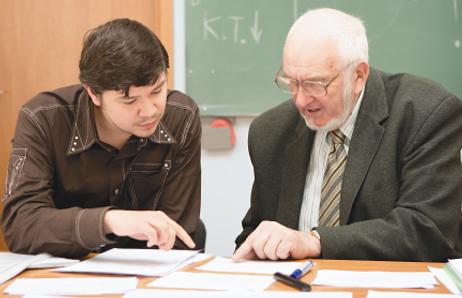As class sizes across the country continue to rise, many community college students struggle to connect with instructors. Students must strive to build positive working relationships with instructors to combat some of the potential issues of over-sized classes or to even further benefit from smaller classes.
Building positive student-instructor relationships allows students to gain more personal assistance, work through the course material more effectively, and ultimately perform better.
Benefits of Building Positive and Professional Relationships with Instructors
Improved Course Work
One of the primary benefits of building effective relationships with an instructor is a student’s ability to receive more specific feedback and instruction, whether they are taking prerequisite or elective courses. Students who establish positive professional relationships with instructors can obtain more insight into creating a particular course plan for increased progress.
As Jacobson suggests, students should meet with instructors after large assignments or tests are returned. A “mini-conference,” or meeting with an instructor, allows both parties to focus on the finished final assignment, essay, or test. With this idea, Jacobson also asserts, “this approach may seem time-consuming, it rarely becomes a daunting process […] Once some of (students) major […] problems have been identified and correction methods have been explained, most of the students begin to use the specific information they have received to self-monitor their (work).”
Additionally, according to Jacobson, the more students meet with instructors early in the course, the less time students will need to meet with an instructor later – as you have already solidified your course fundamentals.
Also, in meeting with instructors individually, students can understand what to focus on for further improvement, allowing the whole group class time to run more smoothly and effectively.
Most specifically, Jacobson acknowledges that writing assignments are among the biggest struggle areas for community college students; as such, meeting with an instructor for individual writing assistance often allows students to progress faster than in a larger setting. Ultimately, especially regarding writing and/or essay assignments, “To be effective, evaluations of developmental student essays must be thorough. Specific feedback helps students identify both strengths and weaknesses in their writing.”
Establishing Relationships to Prevent Potential Problems
In addition to helping students with coursework, building positive relationships with one’s community college instructor also allows students to foster a positive interaction that can open up the opportunity for dialogue if a disagreement later arises.
Whether students disagree with a designated grade or with an instructor’s course content or teaching strategies, a strong relationship established early in the course can allow students and instructors to negotiate any potential concerns more fruitfully.
How to Establish a Positive Relationship with Community College Instructors
Meeting for an Individual Conference
Meeting with an instructor individually is one of the best ways to establish a positive working relationship. As researcher Linda Jacobson explains, “Individual conferences and thorough evaluation make it possible to clarify specific concepts that, for a particular student, may not have been clear from the text or general classroom discussion.”
In meeting for a conference, a student can ensure that he/she is on pace with the rest of the class and may even judge how to make the class more challenging or beneficial by investigating supplemental texts or advanced assignment opportunities. As Jacobson further explains, meeting individually with an instructor also gives the teacher an “opportunity to give positive written and oral feedback to the student […] When students engage in this process and receive specific information, they can focus on improvement and build on strengths.”
Taking Advantage of Office Hours
The best way to meet with an instructor for a conference or meeting is during the instructor’s office hours. As Ecampus Tours supports, “You probably aren't going to get very far if you try to talk to your professor immediately before or after class […] Instead, drop by to see him during regular office hours or email him requesting an appointment. Your professor will be able to devote more attention to the issues you wish to discuss if you confront him at the appropriate time.”
The instructor should announce his/her office hours on the first day of class; however, if he/she does not, students can inquire about office hours times before or after class or via email.
How to Prepare for an Individual Conference
As Ecampus Tours further explains, the best way to prepare for an individual conference with one’s community college instructor is by coming prepared with an agenda of issues, concerns, or topics of discussion: “If you need to talk to your professor about your grades, be sure to take all your graded papers, tests, etc. with you. Make a list of the items you would like to discuss or any questions you may have.”
How to Address Grade Concerns or Disagreements
Specifically, if a student plans to meet with an instructor to discuss a specific dispute or concern, Ecampus suggests: “To effectively confront your professor, you must be polite. Use kind words to explain your situation and be aware of your tone of voice and body language.” To discuss concerns or disputes, students should plan to meet with an instructor during office hours. Once a student has addressed his/her issue, students should allow the instructor to speak and discuss his/her point of view.
When discussing a possible disagreement, “Try to gain a clear understanding of (the professor’s) stated reasons. Once the two of you understand each other, you can work together to come up with a solution.” In addition to being open to communication, Ecampus adds that students should allow “your professor know that you are willing to put forth the extra effort required. If you are convinced that the work you already submitted deserves a better grade, your professor may be open to the idea of getting feedback from another professor. Just be ready to improve upon your work if your professor's colleague agrees with the grade already given.”
What to Do if a Student-Teacher Relationship is Ineffective
If meeting with a community college instructor is not beneficial, or if a student is continually struggling even after seeking independent help from the instructor, students can seek the aid of an instructor’s department chair. Ecampus Tours explains, “While department chairs are extremely reluctant to change grades since professors have considerable freedom in the classroom, he/she may be able to intervene if you strongly believe that you are being treated unfairly by your professor.”
By taking steps to develop rapport and relationships with your professors or instructors proactively, you can improve your academic performance and open important communication lines.
References:
Jacobson, Linda Olson. “Valuing Diversity – Student-Teacher Relationships that Enhance Achievement,” Community College Review-Journal, Summer 2000, available at https://eric.ed.gov/?id=EJ611812
“Meeting with Teachers,” available at https://www.berkeleyparentsnetwork.org/advice/school/meetingteachers
Montgomery, Bette. “The Student and Cooperating Teacher Relationship,” available at http://www.natefacs.org/Pages/v18no2/v18no2Montgomery.pdf
Questions? Contact us on Facebook @communitycollegereview.














